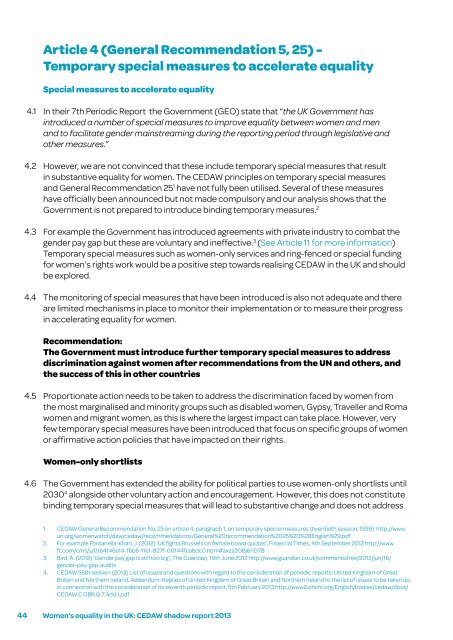Women’s equality in the UK – A health check
Women’s equality in the UK – A health check
Women’s equality in the UK – A health check
Create successful ePaper yourself
Turn your PDF publications into a flip-book with our unique Google optimized e-Paper software.
4.1<br />
4.2<br />
4.3<br />
4.4<br />
4.5<br />
4.6<br />
Article 4 (General Recommendation 5, 25) -<br />
Temporary special measures to accelerate <strong>equality</strong><br />
Special measures to accelerate <strong>equality</strong><br />
In <strong>the</strong>ir 7th Periodic Report <strong>the</strong> Government (GEO) state that “<strong>the</strong> <strong>UK</strong> Government has<br />
<strong>in</strong>troduced a number of special measures to improve <strong>equality</strong> between women and men<br />
and to facilitate gender ma<strong>in</strong>stream<strong>in</strong>g dur<strong>in</strong>g <strong>the</strong> report<strong>in</strong>g period through legislative and<br />
o<strong>the</strong>r measures.”<br />
However, we are not conv<strong>in</strong>ced that <strong>the</strong>se <strong>in</strong>clude temporary special measures that result<br />
<strong>in</strong> substantive <strong>equality</strong> for women. The CEDAW pr<strong>in</strong>ciples on temporary special measures<br />
and General Recommendation 25 1 have not fully been utilised. Several of <strong>the</strong>se measures<br />
have officially been announced but not made compulsory and our analysis shows that <strong>the</strong><br />
Government is not prepared to <strong>in</strong>troduce b<strong>in</strong>d<strong>in</strong>g temporary measures. 2<br />
For example <strong>the</strong> Government has <strong>in</strong>troduced agreements with private <strong>in</strong>dustry to combat <strong>the</strong><br />
gender pay gap but <strong>the</strong>se are voluntary and <strong>in</strong>effective. 3 (See Article 11 for more <strong>in</strong>formation)<br />
Temporary special measures such as women-only services and r<strong>in</strong>g-fenced or special fund<strong>in</strong>g<br />
for women’s rights work would be a positive step towards realis<strong>in</strong>g CEDAW <strong>in</strong> <strong>the</strong> <strong>UK</strong> and should<br />
be explored.<br />
The monitor<strong>in</strong>g of special measures that have been <strong>in</strong>troduced is also not adequate and <strong>the</strong>re<br />
are limited mechanisms <strong>in</strong> place to monitor <strong>the</strong>ir implementation or to measure <strong>the</strong>ir progress<br />
<strong>in</strong> accelerat<strong>in</strong>g <strong>equality</strong> for women.<br />
Recommendation:<br />
The Government must <strong>in</strong>troduce fur<strong>the</strong>r temporary special measures to address<br />
discrim<strong>in</strong>ation aga<strong>in</strong>st women after recommendations from <strong>the</strong> UN and o<strong>the</strong>rs, and<br />
<strong>the</strong> success of this <strong>in</strong> o<strong>the</strong>r countries<br />
Proportionate action needs to be taken to address <strong>the</strong> discrim<strong>in</strong>ation faced by women from<br />
<strong>the</strong> most marg<strong>in</strong>alised and m<strong>in</strong>ority groups such as disabled women, Gypsy, Traveller and Roma<br />
women and migrant women, as this is where <strong>the</strong> largest impact can take place. However, very<br />
few temporary special measures have been <strong>in</strong>troduced that focus on specific groups of women<br />
or affirmative action policies that have impacted on <strong>the</strong>ir rights.<br />
Women-only shortlists<br />
The Government has extended <strong>the</strong> ability for political parties to use women-only shortlists until<br />
2030 4 alongside o<strong>the</strong>r voluntary action and encouragement. However, this does not constitute<br />
b<strong>in</strong>d<strong>in</strong>g temporary special measures that will lead to substantive change and does not address<br />
1. CEDAW General Recommendation No. 25 on article 4, paragraph 1, on temporary special measures (twentieth session, 1999) http://www.<br />
un.org/womenwatch/daw/cedaw/recommendations/General%20recommendation%2025%20%28English%29.pdf<br />
2. For example Fontanella-Khan, J. (2012) ‘<strong>UK</strong> fights Brussels on female board quotas’, F<strong>in</strong>ancial Times, 4th September 2012 http://www.<br />
ft.com/cms/s/0/b4146a14-f6b6-11e1-827f-00144feabdc0.html#axzz2OBj6nD7B<br />
3. Bird, A. (2012) ‘Gender pay gap is still too big’, The Guardian, 16th June 2012 http://www.guardian.co.uk/commentisfree/2012/jun/16/<br />
gender-pay-gap-audits<br />
4. CEDAW 55th session (2013) List of issues and questions with regard to <strong>the</strong> consideration of periodic reports: United K<strong>in</strong>gdom of Great<br />
Brita<strong>in</strong> and Nor<strong>the</strong>rn Ireland. Addendum: Replies of United K<strong>in</strong>gdom of Great Brita<strong>in</strong> and Nor<strong>the</strong>rn Ireland to <strong>the</strong> list of issues to be taken up<br />
<strong>in</strong> connection with <strong>the</strong> consideration of its seventh periodic report, 5th February 2013 http://www2.ohchr.org/English/bodies/cedaw/docs/<br />
CEDAW.C.GBR.Q.7.Add.1.pdf<br />
44 <strong>Women’s</strong> <strong>equality</strong> <strong>in</strong> <strong>the</strong> <strong>UK</strong>: CEDAW shadow report 2013


